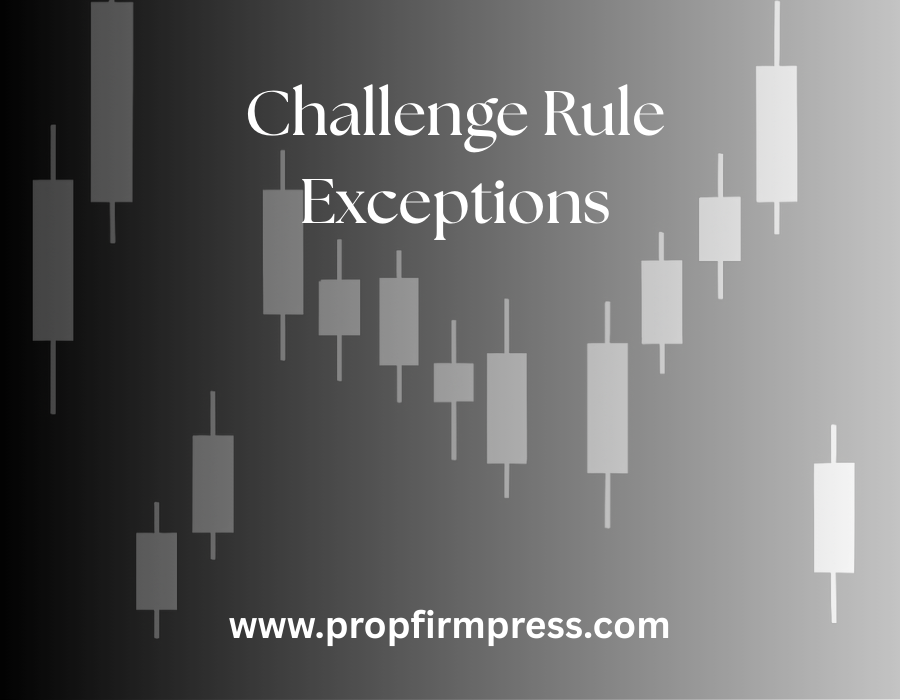Challenge Rule Exceptions
In the realm of prop trading challenges, rules are typically strict to ensure fairness and to simulate real-market conditions. However, many programs incorporate specific exceptions to these rules to accommodate unique situations or to encourage certain trading behaviors. Understanding challenge rule exceptions is crucial for traders aiming to pass these challenges without unexpected penalties or disqualifications.
Common Types of Challenge Rule Exceptions
Most prop trading firms set clear guidelines, but exceptions often fall into several common categories. These can include exceptions for market anomalies, economic news releases, system outages, and even errors in trade executions. Each prop firm varies in its allowances, but recognizing the typical exemptions can help traders better plan their strategies.
Market Anomalies and Volatility Exceptions
Market anomalies such as flash crashes or extreme volatility spikes can unfairly impact a trader’s performance. Many challenges allow exceptions if losses or rule violations occur specifically during these periods. For example, if a trader experiences a loss due to a sudden market gap triggered by unexpected geopolitical news, some firms will assess these events separately and may not count those losses against the trader’s daily or overall drawdown limits.
News Release Day Exceptions
News releases, particularly those related to economic data or central bank announcements, can lead to abrupt price movements. To mitigate unnecessary disqualifications, many firms exclude losses or trades during a short window before, during, and immediately after major announcements. Traders must however check if the challenge specifies blackout periods around news releases and understand how their trades within those moments will be evaluated.
System Outage and Technical Error Exceptions
Technical issues such as platform outages, internet disconnects, or erroneous fills happen infrequently but may lead to abnormal trade results or missed opportunities. Challenges sometimes include stipulations for these events, allowing appeals or exceptions if the trader provides sufficient proof of the incident. Traders are encouraged to report such problems immediately and document them thoroughly for review.
Scaling Plan Exception Rules
Some challenges employ scaling plans where a trader’s risk limits or profit targets increase gradually. Exception rules regarding these plans might allow late entries or one-time adjustments if a trader misses a window due to an approved reason. This flexibility can be crucial for traders managing risk and strategy adjustments within the challenge timeframe.
Exemptions for Trade Size and Volume Limits
Occasionally, traders accidentally exceed trade size or volume rules due to software glitches or split-second decisions. Some firms recognize these as exceptions if the trader shows no intention to violate these limits and the breach is an isolated incident. However, repeated violations typically do not qualify for exception status and may result in challenge failure.
Partial Exceptions: How Losses Are Sometimes Treated Differently
Not all exception rules void losses entirely. Some firms only partially exclude a loss from daily or maximum drawdown calculations, combining this with other conditions such as the time of the trade or the resulting overall balance. Traders should carefully review challenge terms to understand if exceptions apply fully or partially and how this may affect their ongoing performance metrics.
How to Request an Exception
When a trader believes they qualify for an exception, the process usually involves submitting a formal appeal or ticket to the prop firm’s support team. Providing comprehensive evidence such as screenshots, timestamps, broker statements, and detailed explanations is essential. Firms typically review requests on a case-by-case basis and maintain the right to deny exceptions if insufficient proof is provided.
Best Practices to Avoid Needing Exceptions
Although exceptions exist, relying on them is risky. Traders should prepare in advance by carefully reading the full challenge rules, avoiding risky trading during high-impact news releases, and maintaining proper risk management. Implementing robust technical setups and backup plans also reduces the likelihood of disruptions. The best approach is to trade consistently within the established parameters, viewing exceptions only as a safety net rather than a standard buffer.
Impact of Disallowed Exceptions on Challenge Progress
If an exception is requested but denied, any associated trades or losses will count fully against the trader’s metrics. This outcome can dramatically influence challenge progression, potentially ending the challenge prematurely. Understanding this risk emphasizes the importance of following rules closely and managing trades with caution to minimize the need for exceptions.
How Exception Policies Vary Between Firms
Each prop firm has its own philosophy and approach toward challenge exceptions. Some firms adopt a stringent, no-exception policy to mimic real-market trading as closely as possible. In contrast, others offer more leniency and even automated exception triggers for specific scenarios. Traders should compare policies prior to starting a challenge to select the best fit for their style and risk tolerance.
Tracking Exceptions During a Challenge
Keeping detailed records of trades and events provides traders with a clear basis for requesting exceptions. Using dedicated trading journals or software tools designed for challenge tracking helps identify potential exception-worthy scenarios quickly. Early detection and documentation allow traders to address issues proactively with the prop firm’s support before problems escalate.
Legal and Contractual Implications of Exceptions
When joining a prop trading challenge, participants agree to a contractual set of terms and conditions, which include rules about exceptions. Traders should carefully review these agreements because exceptions granted are often discretionary and may not guarantee legal protection from challenge disqualification. Understanding the contractual framework helps avoid misunderstandings and sets realistic expectations about how exceptions are handled.
Trading success comes from discipline and review. Unlock your edge with the Trader’s Monthly PnL Tracker.
